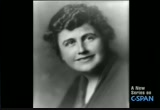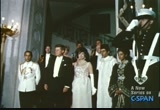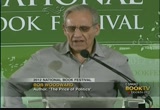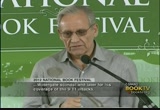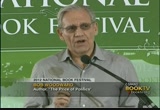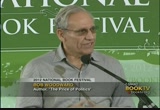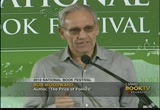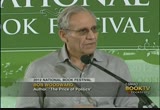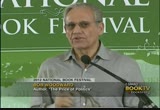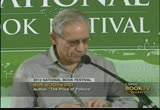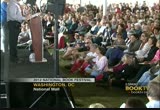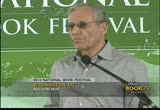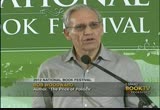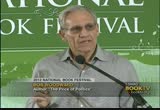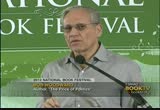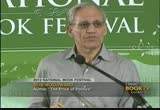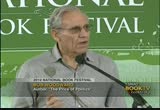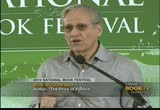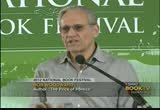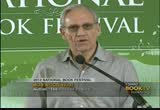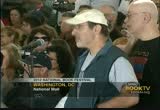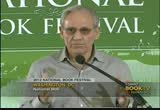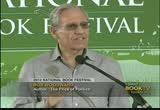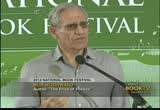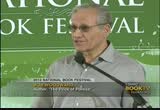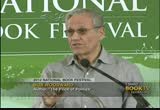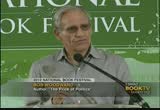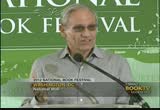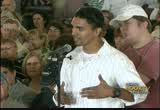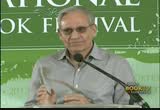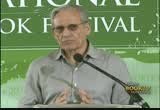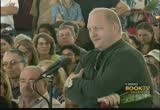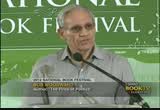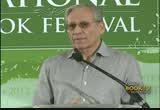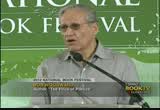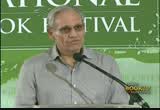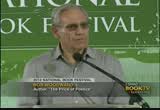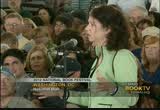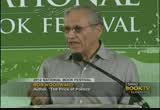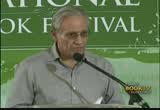tv Book TV CSPAN November 25, 2012 5:15pm-6:00pm EST
5:15 pm
ladies. they never should have married. >> she later wrote in her memoir that i, myself, never made any decision, i only decided what was important and when to present it to my husband. now, you stop and think about how much power that is, it's a lot of power. >> part of the battle against cancer is to fight the fear that accompanies the disease. >> she transformed the way we look at these bug a boos and made it possible for countless people to survive and to flourish as a result. i don't know how many presidents realistically have that kind of impact on the way we live our lives. >> just walking around the white house grounds, i am constantly reminded about all of the people who have lived there before and
5:16 pm
particularly all of the women. >> first ladies: influence and image, a new series on c-span produced in cooperation with the white house historical association. coming in february 2013. >> from the 12th annual national book festival on the national mall in washington, d.c., bob woodward presents his book, "the price of politics." this is about 45 minutes. [applause] >> thank you. thanks.k it's great to be here. i'm going to put myself on the clock so i don't talk too long,h and then we have lots of time for questions. and then we have lots of times the questions. and i want to begin by recounting something that
5:17 pm
occurred about five or six years ago my wife and i were at an aging conference and how to deal with aging. how many people are interested in the subject of aging? raise your hand. okay, you all are. i tell you. at age 69, i am deeply interested in the subject of aging. and they have psychiatrists and physicians and so forth on this panel. james watson, who was the codiscoverer of dna, the nobel prize winner was also on the panel. we had the discussion and it went on for an hour, and watson said nothing. that is the end of zero comments. now, you know the power of silence was just overwhelming, and so finally, the moderator,
5:18 pm
charlie rose asked him, doctor watson, you have done so much work, how do you deal with aging. and so he leaned into the microphone and he said there is only one way to deal with aging. and that is to stay away from old people. [laughter] he nailed it. my wife and i were sitting behind doctor henry kissinger, who was in the audience. they handed out his little sheets where you did self scoring. self scoring on your lifestyle. how often do you eat red meat, how many bowel movements you have a weak. [laughter] general health questions. then you have points or you lost points and you added it up, and
5:19 pm
it told you how many years you had to live. now, how many people here want to know how many years you have to live? the skeptical as him as that might rightly be about the scoring sheet, it's very interesting. kissinger was filling this out with all the intensity hunched over and so elsa and i availed ourselves of the reporter's freedom of information act. [laughter] and we looked over his shoulder. we wanted to see how many years he had to live. he added it all up, and it turned out that he died four years ago. [laughter] not happy. i have seen kissinger really unhappy because of things we have written.
5:20 pm
but this was the depth of unhappiness. and so he looked around, and this was done in pencil. he erased all the answers. he rescored. the last time he ate red meat was in 1949. how often do you exercise a week, seven, eight, nine, 10 times a week. and it turned out that he had eight years to live. what is the lesson here? kissinger is the master of this, read his books, he resource history like no one else. but it is the basic problem in journalism and trying to understand politics and what is going on in the world. i was telling this story the other night about al gore,
5:21 pm
having dinner with him, sitting next to him, not having dinner, sitting next to al gore is taxing. it is really unpleasant. we asked him what was going on in the white house and he said 1%. i believe it is higher. but if we step back, we often don't know what is going on. that is the dilemma. i want to talk briefly and then answer questions about her new book that i have done, which is just out, called the price of politics. it is about 3.5 years of negotiations between the obama white house and the republicans in congress and the democrats. how they essentially tried to bring the federal government's financial house to some kind of
5:22 pm
order. the answer is they failed. we have a federal government whose financial house is in total disorder, total disarray. it is a historic problem. to try to put it in english, we have a trillion dollars of iou outstanding in the world. the negotiations, they agreed to raise what they call the debt ceiling, so the government can borrow a couple more trillion dollars. we are going to run it run out of that borrowing authority january or february of next year. they're going to have to go back
5:23 pm
and authorized congress for more trillions of dollars of borrowing. the republicans and lots of people in congress don't want to authorize that. so there is going to be a bloody negotiation, unless they can work a deal. in a sense, this is a book about the past, but it's about the present. it is about where we are going and what the country's future is. if you think about it i would argue that the inability of the government to fix this borrowing debt deficit issue in the book, vice president biden's chief of staff, talking about the economic crisis in 2011, that's exactly what is going on. there is so much evidence that
5:24 pm
it is the biggest future. we are on the path becoming europe and greece. you just can't keep borrowing money. there is a stunning and fiction in this country, and we need some sort of we need some serious intervention. in the book, what i attempt to do is take people to the presidents and leaders and tell you exactly because of the luxury of time and my publisher, simon & schuster, i declined to get the meeting notes to get the exact detail to interview president obama and speaker boehner and the key players in
5:25 pm
this. i just want to take one quick snapshot from what happened that we didn't know about, which is critical. when the cops pull up less when the president was upset, he called the congressional leaders on a saturday morning at 11:00 o'clock a.m. the democratic and republican leaders were trying to work out their own deal. harry reid, the democratic leader, said to the president, mr. president, could you please leave the room? i have covered presidents for four years. i know of no other time where the president was asked the meeting in his own house that he had called.
5:26 pm
i asked the president about this. i said how did it feel to be voted off the island in your own house. because that is what happened. he said that he was not going to stand on protocol, that the problem needed to be solved. but in the next day, he called democratic leaders to the white house from 6:00 o'clock on a sunday night. and harry reid is there, the house leader, the relations between and among the democrats are so not solved, that harry reid, is a chief of staff, makes a presentation on the deal if reid is trying to work out with the republicans. in the course of doing that, david corn says to the president of the united states, in the
5:27 pm
oval office is in his house, i am disappointed in this white house and you for not having a fallback plan. literally, again. somebody reading of the president in the oval office for not having a plan. after the meeting, harry reid said to his chief of staff, stood up to him, he needed to hear it. no one was telling him. think about it for a moment. what is the second most powerful democrat in washington have to use his chief of staff as a lever to send a message to the president of the united states? i was talking to somebody from amazon.com the other day. as you may know, they take books and they divide them as red states and blue states. most of the books selling in red states, republican state, blue state, democratic states, and i
5:28 pm
have said, where does this football? where is it to and he said well, it's purple. because it has information about both sides in all of us. it shows that there is a war going on, not just in the democratic party, but the republican perhaps much more intense. john boehner is trying to work a deal with the president to do tax reform and entitlement reform and his deputy, the majority leader, calls people like paul ryan, who is now running for vice president. ..
5:29 pm
>> if you keep doing this, you are going to risk your speakership. the president said when i talked to him, interestingly enough, he said in fixing -- he realizes the magnitude of all of this, as does speaker boehner, key democrats, key republicans realize what it is. and the president literally said to me, i would willingly lose an election if i could solve these problems. it is that serious. tim geithner, the treasury secretary, in the book is quoted thousands of words telling the president, you have got to do something about this problem. we have to fix it. you literally, it's not that
5:30 pm
we're going to close down the government, we will close down the american economy and, in turn, the global economy. if they do not solve the issue of this runaway spending, get some way to stop borrowing in excess, he tells the president of the united states if we default on this, on our obligations and our ious, we will trigger a depression worse than the 1930s. anybody here remember the 19 1930s depression? you probably don't. i don't. i was not born, but i've read about it. it was a calamity for the world. tim geithner said to the president what, if we default on this, if we do not solve this
5:31 pm
problem, we will have an economic catastrophe that will make the 2008 financial crisis a footnote in the history books. anyone remember the 2008 financial crisis? that's coming not from some columnist or journalist, that is coming from well-informed secretary of the treasury. you think about this, there is a value in running scared. if you think about after 9/11, the terrorist attacks, one thing the country did collectively is they set up tsa, the screening at airports. there are all kinds of work, very significant work done to make sure terrorists did not get into this country. it's been successful to date.
5:32 pm
it is one of an amazing achievement. if you think about september 12, 2001, the day after 9/11, it was almost a certainty there were going to be terrorist attacks in this country. there are not been. hundreds of billions of dollars have been thrown at it, all kinds of intelligence efforts, screening efforts, thinking efforts, some of them perhaps extreme, but it worked. this was a time when the government and it leaders in both parties ran scared. they are not running scared on this issue. and if you look at it, it is the thing we know about that is going to do us in. and we've got to fix it. and go for a moment to the presidential campaign going on before us.
5:33 pm
what are they talking about? not this. not the ting that's most evident -- not the thing that's most evident. why are they not talking about it? part of it i would say it's the responsibility of the people in my business, the media. the candidates are not being asked about it enough. it's also complicated. um, it's also something the candidates if you look at what they have said on this issue, both obama and romney's plans are vague. if i were moderating the debate that is coming october 3rd, i would spend about half of it asking them what would you do specifically. give us the diagnosis of the plan -- [applause] and tell us what you're really going to do. and part of that question is there has to be a willingness to compromise, and there has to be an innate willingness to do things that are painful for your
5:34 pm
side. i'm going to stop there, and we'll do questions. one more story. remember years ago the head of simon & schuster after i had published one of my books took me to dinner in new york city at one of these restaurants where you would never want to go where you have to pay. [laughter] and he said what's your next book going to be about in and i said, oh, well, i haven't decided. i'm going to do some thinking, some reading, some research. and he looked at me and said, what? i said, yeah, i want to do thinking, reading, reporting, weighing the alternatives, and he said why are you going to waste your time? [laughter] i said, well, that's what you try to do. and he said, no, no, no, you are one of our authors. i need to know right now, tonight, what your next book is going to be. i said this is, that's preposterous. he said, i need to know.
5:35 pm
now, he's one of these people who grinds on you, and you're at dipper alone no matter what would come up, he would bring the subject back to, oh, maybe you should do a book on that, what about this? he would just grind away. you may know people like this. [laughter] you may work for somebody like that. [laughter] even better, you may be married to somebody like that. [laughter] who just grinds away. so he wouldn't let up. so finally at the end i said to him, i figured out what my next book is going to be. he said, oh, that's great. he said, what? i said, my next book will be an expose of the publishing business in new york city. [laughter] and instead of showing disappointment, he said that's a terrific idea. i have a great title for you. i said, i don't think there are any great titles left. he said, there's one. i said, what? he said, your book, an expose on the publishing business in new york city would be called "my
5:36 pm
last book." [laughter] and he meant it. [laughter] [applause] okay. questions. open microphone. go ahead, sir. >> yeah, hi, bob. i want to ask you something that's alluding to the off-the-line comment you said on al gore. you know that you've been studying the white house 40 years, and you know people all have their own perspective, they all want to be saying things. and if you're the president, you have to listen to all these people. over your 40 years, how did the presidents react, and which ones really did a good job listening and making decisions? >> yeah, that's a great question. i mean, in journalism the great art, and it's hard, is to really listen. and the key to getting people to talk is to take them as serious a. [applause] atake themselves. -- seriously
5:37 pm
as they take themselves. that's one comment feature. president, most people in government, they take themselves seriously. you find increasingly with all the presidents i've tried to understand that the more time they get in office, the more they like to talk and the less they like to listen. and that's a problem. and i was reading the george cannon biography, one of the great books. he's the diplomat who really established the containment policy. and at one point cannon writes in his diary when they've made him ambassador to yugoslavia, he says there is a treacherous curtain of deference that falls on you as the boss. happens to everyone. but it happens ten times to presidents, that treacherous curtain of deference. and everyone is, oh, mr.
5:38 pm
president, mr. president. and what a president, like any leader needs, is somebody who will tell him the truth. >> this upcoming election and before the inauguration has been described as a period of time that's going to be the lame duck session of all lame ducks. and i wanted to ask you the same question that you would ask the candidates which would be something like we're about, we're approaching a fiscal cliff, and this is all going to the happen shortly after or just prior to the inauguration or some time in january. what, what is the, what do you see or what do you predict or what needs to be done to avoid this fiscal cliff? >> okay. happily, i don't have to decide. [laughter] and i don't know. but, i mean, the fiscal cliff is a euphemism. i mean, it's financial.
5:39 pm
it's the basic financial soundness of the government which connects, believe me, to the value of everything you have, a house, a bank account, an investment and so forth. and it is all in jeopardy. it should be called the financial time bomb. and it's tax increases, it's spending cuts, but it's also what i spent a lot of time in the price of politics writing about where you have to extend the debt ceiling. they, the white house, whoever is there, is going to have to go to the congress and say, gee, you know what? we're borrowing a trillion dollars. i mean, think about, i was trying to figure somebody was asking, well, how much is a trillion dollars? that's about $3,000 for everyone in the united states. that's a lot of money. they have to borrow that next year just to pay for what's going on. and how they're going to do that, how they arrange it, i
5:40 pm
don't know. it's going to be, you know, i may have my second book. go ahead. >> hi. in your interviews and in your research, i was wondering how much you came across discussions among the leadership about dealing with the serious problem of jobs in this country. because we're in a second major depression many say since the great -- and it's sort of contrary or contradictory to be concerned about the budget deficit where you'd be taking steps that have a negative effect on the economy, so how much did that take effect -- >> excellent question. and, of course, you create jobs by growing the economy, and you have to not only grow the economy, you need to stable i'd it -- stabilize it. you can't have the situation we're in where the interest rates are right in the basement. and as someone says, you can't jump out of the basement.
5:41 pm
that's as low as it is. and if people stop trusting u.s. treasuries, the $16 trillion of debt we have out there, interest rates are going to skyrocket, interest payments will go up annually potentially by hundreds of billions of dollars, then we would have more deficit, there would be less trust. and so you haven't -- you've wrecked the government's role in the economy. those are my secret notes, i'm going to ping -- pick them up. [laughter] so you have to stabilize that. and you have to figure out a way to get the economy to grow. and that's a long-term proposition which will lead to more jobs. but you're right, there's some contradictions in all of this. but in trying to create more jobs, you can't mess up with the overall problem of the
5:42 pm
trustworthiness and creditworthiness. you're shaking your head. we'll talk afterwards. next. >> hi. over the course of your career, you've had the most incredible access to all these, um, great politicians in history and even today, and i was just wondering out of everyone you've met, who surprised you the most? who is like the least like how they are perceived in history and in the current media? >> oh, wow. that's like asking the question about the creation of the universe. [laughter] they're all interesting, they all have their -- i mean, i just get fascinated with the story of government and what really works and, quite frankly, what we don't know. what is hidden. i remember for a book i did called "the agenda" on bill clinton, and it was about his economic plan. i interviewed him once, and it
5:43 pm
was on background. but he's talked about it, so i have talked about it. and you go into to the oval office. this was early 1994, and clinton drills you with this eye contact that is absolutely a gravitational force. i've never seen anyone maintain eye contact like bill clinton. and to a -- and it's unblinking. and he just stares and, of course, it creates a sense of intimacy, it slows time down, and i remember thinking this eye contact is amazing, and somebody later suggested to me, said, well, he wanted to be president ever since he was 5. [laughter] and he decided to contribute all organs in the body to the task. [laughter]
5:44 pm
including the eyes. [laughter] and it's, you can drain yourself. you just don't -- you can train yourself, you just don't blink. so we're going through there, and i thought, oh, this is a great interview. and he's so focused. i each started thinking, oh -- i each started thinking, oh, he realizes how brilliant my questions are. [laughter] which they weren't. and i thought, left this if and thought, oh, there's this amazing interview. of and i went back and had somebody transcribe it, and i read the transcript without the eye contact, and it was mush. [laughter] he didn't say anything new, didn't say anything that was particularly useful. i think i used one sentence in the whole book from the interview. but, and here's the essence of the clinton communication style, it felt good. [laughter]
5:45 pm
it felt wonderful. [laughter] and if you look at the reagan tapes, when he was president, everyone called him the great communicator. he's a nothing compared to clinton. clinton, i remember interviewing -- there were, there was one meeting where about six or seven people were in the meeting with clinton, and i asked them each what happened, and there was this one woman who didn't say anything. and i said what'd you think of the meeting? and she said i know he agrees with me. [laughter] wow. i mean, that -- i mean, if you can go -- anyway. end of point. >> my question is a little bit simple. it seems to me that where we're at right now is almost at the end of the current monetary system. so my question is, how much talk has there been in your circles about ending the current monetary system, stopping the
5:46 pm
issuing of money at debt and perhaps going to a united states note instead of federal reserves note? >> well, that's a neck call economic issue. -- technical economic issue. you can't bail out on the $16 trillion in ious we have. you just can't. it would be the disaster and the calamity. i don't think, i don't think you can do this with a magic wand. i don't think -- i think the, if you go back to the 1980s, what reagan and tip o'neill did to save social security, they worked a deal where payroll tax went up, the most regressive tax in the history of this country, and they agreed to cut back on some benefits. and part of the deal was -- what's that noise? is gordon liddy out there somewhere? [laughter] you're too young to remember gordon liddy. [laughter]
5:47 pm
you -- o'neill and reagan. part of the deal was we're raising the tax, we're cutting some benefits, and so o'neill says to reagan, look, you go out and say whatever you want about what this deal is. and i won't contradict you. and i'm going to go out, and i'm going to say, describe the deal i want it described, and don't you contradict me. deal made, it's gone. no one, no one objected. it was voted through the congress. people who ran, i know a couple of senators who ran i think first in 1983 like john kerry. he said in his campaign the issue never came up because there was no clash. there was no conflict. part of the deal was, i mean, look, obama and speaker boehner would have a much harder time making a deal because they had
5:48 pm
problems in both of their parties as they say, but in talking about this with them if they'd had -- what's the word? -- courage to say let's make a deal and go out, get before the microphones and the cameras and say this is what it's going to be, and this is going to be painful, and we're going to ask all democrats and republicans to vote for it because we have to protect our financial future, because that's what it's about at the end. they essentially told me they thought it would work, that they could have done it. and, of course, they did not. yes. >> are bob, that's a good lead-in to my question. the grand bargain that came to the floor towards the end, the president put entitlements on the table. i don't recall the world unraveling from that notion. how real do you suppose that proposal was, and are we likely
5:49 pm
to revisit that in the spring? >> well, it gets into detail, and i have a whole chapter on this, and it has to do with six senators saying, gee, we can ask for more revenue, it included three more republicans. david plouffe, who's the president's political adviser, campaign manager in 2008, has tremendous influence in the obama white house. am i pointing the right direction? is the white house that way? is yes, okay. and he said, we've got to do something, we have to ask for more revenue. and one of clinton's -- one of obama's other advisers came this and said -- came in and said if you don't ask for more revenue, you will be part of the presidency, the weakest presidency in the history of mankind. i mean, imagine being in that situation, getting that advice from one of your aides. so the president picked up the
5:50 pm
phone and said we need more revenue. he insists it was an offer speaker boehner is equally insistent that it was a demand. i talked to him, talked to all the people. now, no one else was in the room, there's no secret tape recording of that phone conversation i know about. if anyone does, please, give me a call. [laughter] but why do that on the phone? you shouldn't do that on the phone. you should other people there so it's carefully, you know, i mean, it was changing or making a proposal at the end that set this off on a track. it is a very dramatic story, and it brings to the fore the issues that we're going to be dealing with in three or four months. yes. >> you may have already allude today this somewhat in answering a previous question, but, you know, congressional approval is at record lows, and people left, right, center, everywhere talk
5:51 pm
about how broken government is. and what are those things there your perspective that have broken it, and what are those things that if they were removed either individual or structural, um, that would help fix it? what's the path forward? >> you know, that's above my pay grade. [laughter] it's, it's enough of a task to try to find out what happened and so forth and to -- you do play in your own mind what should have happened, what could have happened. i mean, it's a pattern. it's gone on a long time. a lot of people, and there are books on this, there's analysis saying it's all the republicans' fault. there are books and analysis that it's all the the democrats' fault, it's all obama's fault. i'm purple on that question and in the book conclude that they both have responsibility for this. [applause]
5:52 pm
and it's a shame it's not part of the dialogue going on in the election. we're going to pay a price for this, and just, you know, the note on your blackberry that we talked about this september 23rd, and when the bridges start burning in or -- in four or five months, i was saying this to somebody. if you remember 9/11, in august of 2001, six weeks before 9/11, there was a top secret intelligence briefing given to president george w. bush. and the headline of that top secret briefing was, and we ran it in "the washington post" after it became a big issue, was bin laden determined to strike in u.s. now, think about that. you're the president of the united states, you get a top
5:53 pm
secret report saying bin laden determined to strike in the u.s. you should do something. well, we know not enough was done can. we know that the government across the board failed to do what was necessary on potential terrorism, and we had 9/11. i tell you the theme song, the big music in this book i've written that i've tried to present is u.s. economy about to falter. and it's a warning. and it's disappointing, to be honest with you, it's agonizing that it can't get into the dialogue because we have a presidential election six weeks ago -- six weeks from now in
5:54 pm
which whoever, whether's obama, romney, they're going to have to sit there, and this is what they're going to be spending your time on. yes, young man. >> hi. um, i just -- oh, 13. >> thank you. >> i just wanted to say, first of all, that i am right in the middle of the price of politics, i'm in the middle of chapter 20, so it's an incredible book, so thank you very much for writing it. >> i know lots of adults who can't read it. [laughter] >> thank you. so, um, my question is, um, i'm at the end of middle school, and i want to become a journalist when i grow up, so -- [applause] okay. so you have had an incredible career, and you're one of my idols, so i just wanted to ask you, um, any tips for young people like me who want to become a journalist and want to see the world? [applause]
5:55 pm
>> you've chosen, perhaps prematurely -- [laughter] a great career. i've often said if somebody came from another planet to the united states to spend a year and they went back to, say, mars and they said who are the people that have the best jobs in america, the interplanetary visitor would say, oh, the journalists. why? because as a journalist you get to make momentary entries into people's lives when they're interesting, and when they're boring, get out. [laughter] there's no other profession where -- if you're a lawyer, you're stuck with clients that may be boring. if you're a doctor, you're stuck with patients, it may be routine. in journalism the question every morning when you go to work or whenever it is, what's going on, what's going on that has meaning, and what don't we know about it? and so if you think about it,
5:56 pm
um, good luck. let me know when you're looking for a job. [laughter] [applause] what's interesting, he's telling -- the book is 40 chapters long, and he says he's halfway through on chapter 20. >> i'll challenge you. as a nurse practitioner, you get to be involved with people at the most important times of their life. [laughter] i love that job too. [applause] >> well said, well said. >> but my question is about the freedom of information act. and small-time people like me can't get the same information you can. so, for example, i represent my little citizen association, and i asked lincoln county for some information on where they're spending money in a certain area, and you they would chargee $850 to get that. and another time i asked they said, well, it would be about
5:57 pm
three or four thousand pages -- boxes, not pages of stuff, boxes of things. how as a small-time person who already has a full-time job, how do we work with the freedom of information act to get the information we want? >> okay. somebody from the library of congress, dr. billington, was asking me in the movie version of "all the president's men," the reporters go to the library of congress to look at what the white book, the white house has been checking out, and somebody said, gee, can you go to the library of congress and find out what other people have been checking out? and, of course, no. but how did we get somebody? we went to somebody, and it's in the movie, and we said, sorry, dr. billington, how about breaking the rules? how about helping us? we're not going to misuse this information. go to the people who have those
5:58 pm
documents and say, look, um, why don't you help me, give them to me. you've got them here, i'll get 'em xeroxed or something like that. and an appeal -- it's amazing. i, in fact, think that everyone in the united states is a secret sharer, believer in the first amendment. and appeal to conscience. if you can't get them to help you, call me, and i'll call them on your behalf, okay? [laughter] [applause] >> i'm sorry that we don't have time. >> yes. mail is woodwardb woodwardb@washpost.com. if anybody else has good information. last question, right? oh, i'm sorry. i'm over time. my god. yes, quick. >> one last question. >> hi, mr. woodward. big fan of your work.
5:59 pm
unlike the young man who just came before me, i still haven't had a chance to read your book, but i look forward to. it seems like a theme throughout this book is the sort of both sides do it, color purple, bipartisan thing. now, of course, politics is very much about having two different sides with admittedly, you know, different views of america and different policy solutions, going out into the public, presenting their views and then having the public decide through elections or through civil discourse what policy direction they want to take. so i'm interested in terms of the sort of access you've gotten to the democratic and republican leadership in your view of the debt ceiling debacle whether you found that one side or another side was more intransigent or much more stubborn to negotiation or concession than the other side. >> that's a great question, and i do put responsibilities on both sides, but i do say at the end that if you look at presidents reagan, presidents clinton, criticize them as you might in lots of areas, by and large on
120 Views
IN COLLECTIONS
CSPAN2 Television Archive
Television Archive  Television Archive News Search Service
Television Archive News Search Service 
Uploaded by TV Archive on

 Live Music Archive
Live Music Archive Librivox Free Audio
Librivox Free Audio Metropolitan Museum
Metropolitan Museum Cleveland Museum of Art
Cleveland Museum of Art Internet Arcade
Internet Arcade Console Living Room
Console Living Room Books to Borrow
Books to Borrow Open Library
Open Library TV News
TV News Understanding 9/11
Understanding 9/11